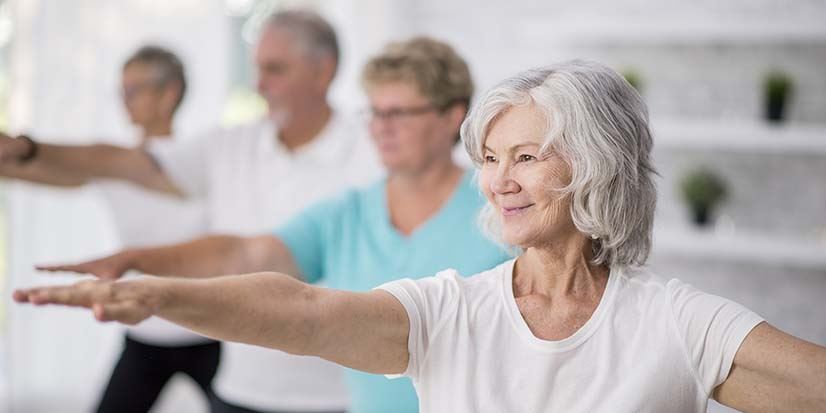Regular Activity Yields Physical and Mental Benefits
- Category: News, Wellspring
- Posted On:

The holiday season can be a minefield of hazards to a healthy diet and regular exercise, but it can also be a great time to invite change into your life. Nearly two-thirds of American adults making New Year’s resolutions include the goal of exercising more. This is a worthwhile goal, with only one in five American adults and teens getting enough regular exercise to maintain good health according to the American Heart Association.
Meeting recommended levels of activity for long-term health does not necessarily mean a significant lifestyle change. Adults should get at least 150 minutes of moderate exercise a week, or 75 minutes of vigorous aerobic exercise. Ideally, a person should have a mix of the two. Moderate exercise is something that causes elevated heart rate and some sweating, like a brisk walk or walking up a slight incline. Vigorous exercise is something that causes your heart to pound, that you are not able to keep up for a long time. During this kind of activity it is much more difficult to carry on conversation at the same time.
One of the easiest ways to start is by walking, starting slow for about 10 minutes or so, and then building up a faster pace and for longer times as you get more comfortable. Any boost in activity is beneficial. If, or when, you are up to it, more benefits tend to arrive when you are physically active 300 minutes each week, which could be divided into one-hour blocks five days a week.
Many people start an exercise program to lose weight, but there are many other benefits of regular exercise as well. Increased activity affects brain chemistry to reduce symptoms of anxiety and depression. Exercise can also impact brain health to increase processing speed, improve cognition, boost memory and help increase focus. In the long term, studies have shown that exercise helps to ward off symptoms of Alzheimer’s disease and dementia.
The payoff of keeping up with exercise also includes more energy and being better rested from day to day, sometimes helping to improve chronic sleep conditions like insomnia and obstructive sleep apnea.
Staying physically active also helps prevent accidents, and particularly falls, by improving your sense of balance. Exercise also encourages bone health, so if you have an accident, you’re less likely to suffer a fracture or break injury.
For many people the hardest part of exercising is consistently sticking with it over the first few weeks, so it becomes routine, the same as brushing your teeth.
There are countless ways to get up and out and be active, and you can find one that suits you best. That may be swimming, hiking or biking, or if you don’t like exercising alone, find a club or a class. Additional health benefits can come with enjoying activities with people like yourself, not to mention benefits of enjoying the company of people that initially may not seem much like you at all.
Sauk Prairie Healthcare’s Wellspring provides state of the art equipment and a range of classes for different interests and intensity levels. Health fitness specialists can provide a complimentary equipment orientation and exercise prescription to members. Personal trainers are also available for those who may benefit from some extra attention or are looking for someone to help add accountability to their exercise program.
